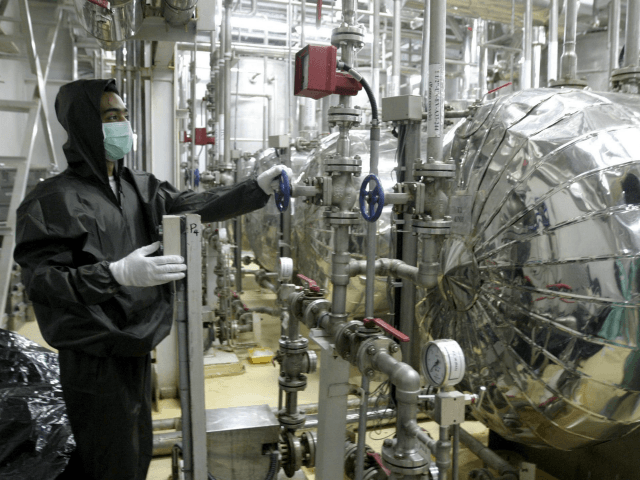Rafael Grossi, head of the International Atomic Energy Agency (IAEA), told European Union (EU) foreign ministers in Brussels on Monday that Iran continues enriching uranium to much higher levels than needed for any commercial application.
According to Grossi, Iran’s uranium enrichment has slowed down slightly since the end of 2023, but Iranian centrifuges are still producing about seven kilograms of 60 percent pure uranium per month.
Sixty percent purity is far higher than required for any peaceful application but is just below the threshold of “weapons grade.” No other country on Earth has produced 60 percent pure uranium for any purpose other than developing nuclear weapons.
The IAEA said Iran produced about three kilograms of 60 percent uranium between June and November 2023 but then surged to nine kilograms for the last few months of 2023 — right about the time Iran kicked out a third of the IAEA’s inspectors.
Grossi was furious when Iranians “de-designated” his agency’s most experienced inspectors. He described it as an unprecedented and poorly explained action that dealt a “very serious blow” to the IAEA’s ability to conduct meaningful inspections.
One of the IAEA’s most experienced inspectors, in January 2023, detected a major spike in enrichment purity that Iranians did not properly report — a spike that took some of Iran’s uranium to a record high of 83.7 percent. Iran “de-designated” the Russian inspector who noticed that spike shortly before it kicked out the others in November.
Grossi complained in January 2024 that Iran was holding the IAEA “hostage” to its political disputes with the United States and other Western countries.
“It’s a very frustrating situation. We continue our activities there but at a minimum. They are restricting cooperation in a very unprecedented way,” he said.
Grossi said on Monday after his meeting in Brussels that Iran’s habit of surging and then relaxing enrichment did not conceal its fundamental “trend of constant increase in inventory of highly enriched uranium.”
“There is a concerning rhetoric; you may have heard high officials in Iran saying they have all the elements for a nuclear weapon lately,” Grossi said, alluding to Iranian officials boasting they could build nuclear bombs quickly if they wanted to. The IAEA itself estimated in November that Iran has enough highly enriched uranium to produce “several” nuclear weapons.
“We seem to be drifting apart,” Grossi said of his relationship with the Iranians.
“Iran says they are not getting incentives from the West, but I find this logic very complicated to understand because they should work with us,” he said. “It should never be contingent on economic or other incentives.”
Grossi said he hoped to visit Tehran in March to mend fences with Iranian officials at some point after he makes a planned trip to Moscow for meetings with Russian President Vladimir Putin about Iran, the Middle East, and Ukraine.
“Russia has a role to play on Iran. It has played a role in the past as a JCPOA country, and in the current circumstances where JCPOA is all but disintegrated, something must fill the void,” Grossi said.
JCPOA, or Joint Comprehensive Plan of Action, is the formal name of former President Barack Obama’s nuclear deal with Iran, which his successor, Donald Trump, withdrew from in 2018 because he said the “decaying and rotten structure” of the deal would not prevent Iran from developing a nuclear bomb. Trump said it was crucial to pull out of the deal and reinstate sanctions on Iran to hinder its other malevolent endeavors, such as supporting terrorism.

COMMENTS
Please let us know if you're having issues with commenting.